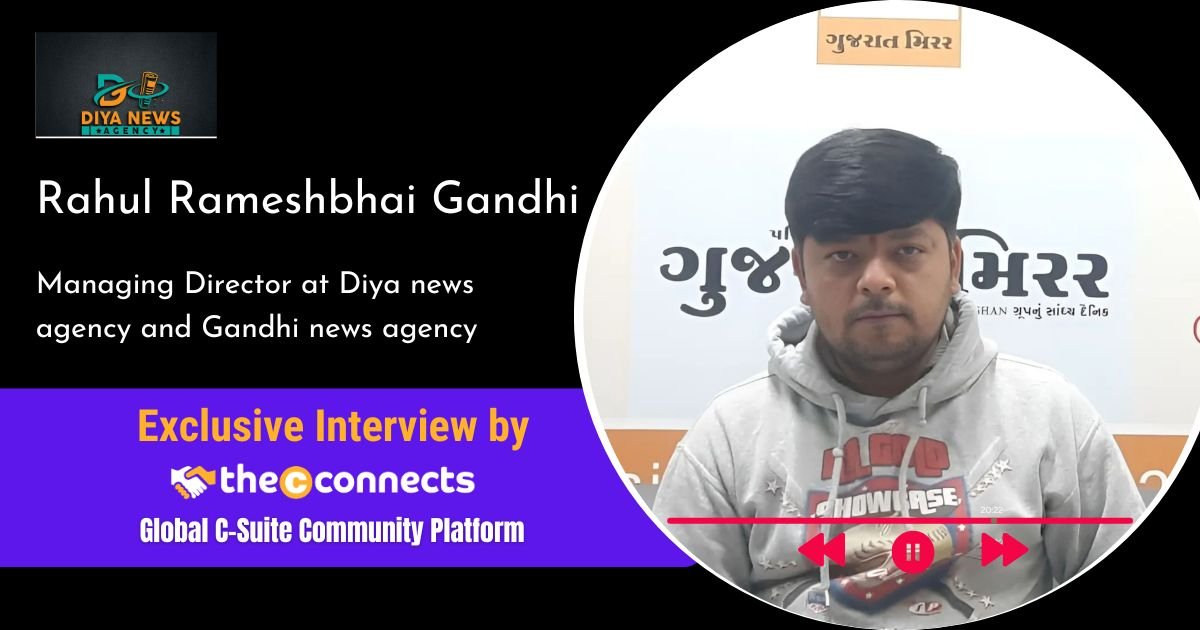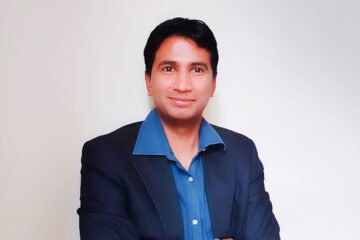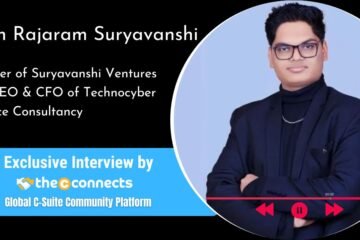In the heart of Mumbai’s vibrant media scene, Rahul Rameshbhai Gandhi Rameshbhai Gandhi has carved a niche as a journalist and entrepreneur with a relentless passion for truth. As the Managing Director of Diya Publicity and Gandhi News Agency, and a city agent for Jamnagar Lokvaat Dainik, Rahul Rameshbhai Gandhi brings 12 years of experience to the table. His affiliations with the Human Rights Council and the Crime Surveillance and Intelligence Council reflect his commitment to social justice and accountability. In this exclusive interview, we dive into Rahul Rameshbhai Gandhi’s journey, his vision for journalism, and his insights on navigating the evolving digital landscape.
TheCconnects: Rahul Rameshbhai Gandhi, thank you for joining us. Let’s start with your journey. How did you find your calling in journalism, and what led you to establish Diya Publicity and Gandhi News Agency?
Rahul Rameshbhai Gandhi Rameshbhai Gandhi: My journey began in 2013, right here in Mumbai, where the energy of the city and its stories captivated me. I grew up in a family that valued open dialogue, and I was always curious about what shaped people’s lives, whether it was policy, crime, or social change. After studying mass communication, I started as a freelance reporter, covering local beats for small publications. Those early days taught me the power of a single story to spark change.
Founding Diya Publicity was a natural step. I saw a gap in the market for authentic, impactful publicity that didn’t compromise on ethics. Gandhi News Agency followed as an extension of that vision, to deliver unfiltered, credible news. Both ventures are built on the idea that information should empower, not manipulate. Today, we serve over 50 clients, from startups to corporates, and have published over 1,500 articles, many of which dig deep into issues like human rights and governance.
TheCconnects: That’s inspiring. Who has been the most influential figure in shaping your approach to life and work?
Rahul Rameshbhai Gandhi: My late mentor, a senior editor at a national daily, left a deep mark on me. He taught me that journalism isn’t just about reporting facts, it’s about asking the right questions, even when they’re uncomfortable. He’d say, “If you’re not ruffling feathers, you’re not doing your job.” His insistence on integrity over sensationalism stuck with me. On a personal level, my parents instilled a sense of duty to give back to society, which drives my work with the Human Rights Council and Crime Surveillance and Intelligence Council. Their influence keeps me grounded, reminding me that every story we tell has a human impact.
TheCconnects: Speaking of impact, what’s been the toughest challenge you’ve faced in your career, and how did you navigate it?
Rahul Rameshbhai Gandhi: The biggest challenge came around 2018 when digital media was exploding, and the line between news and noise was blurring. Clickbait and fake news were eroding trust in journalism, and we faced pressure to churn out sensational content to stay relevant. At the same time, Diya Publicity was still finding its footing, and we had to compete with bigger players with deeper pockets.
I tackled it by doubling down on our core values. We invested in training our team, 20+ journalists since then, to prioritize accuracy over speed. We also embraced technology, like data analytics, to understand what our readers wanted without compromising our standards. For example, we used reader engagement data to refine our coverage, which boosted our social media reach to 10,000 monthly engagements by 2024. It wasn’t easy, but staying true to our mission helped us carve out a loyal audience.
TheCconnects: That’s a testament to resilience. What’s a key lesson you’ve learned that you’d pass on to others in the industry?
Rahul Rameshbhai Gandhi: Never underestimate the power of relationships. Journalism thrives on trust, trust with your sources, your team, and your audience. I’ve built a network of over 300 sources across India, from activists to policymakers, and each connection took time and mutual respect. Another lesson is adaptability. The media landscape changes constantly, AI tools, for instance, have cut our content distribution time by 30% since 2022, but you can’t let technology dictate your ethics. Stay curious, stay ethical, and always put the public’s right to know first.
TheCconnects: Let’s talk about the digital space. What do you see as the biggest challenge for brands trying to stand out online?
Rahul Rameshbhai Gandhi: The biggest challenge is cutting through the clutter. With millions of posts, videos, and ads bombarding users daily, brands struggle to capture attention authentically. The temptation is to chase virality with gimmicks, but that’s a short-term game. Audiences today are savvy, they can spot inauthenticity a mile away. The real hurdle is building trust while staying relevant. Brands need to tell stories that resonate, backed by data and delivered consistently. For instance, our work at Diya Publicity focuses on crafting narratives that align with a brand’s values while addressing real audience needs, whether it’s a local business or a corporate giant.
TheCconnects: How does Diya Publicity address these challenges for your clients?
Rahul Rameshbhai Gandhi: We start by listening. Every client has unique pain points, some need visibility, others need credibility. We use a mix of investigative journalism and strategic publicity to address those. For example, for a small business struggling to compete online, we might craft a series of human-interest stories that highlight their impact on the community, driving both engagement and trust. For larger clients, we leverage our network to secure placements in high-impact outlets like Jamnagar Lokvaat Dainik. Our AI-driven analytics also help us track campaign performance in real-time, ensuring we’re hitting the right audience with the right message. Since 2022, this approach has increased client ROI by an average of 25%.
TheCconnects: Your work with the Human Rights Council and Crime Surveillance and Intelligence Council is notable. How do these roles shape your journalism?
Rahul Rameshbhai Gandhi: These affiliations give me a front-row seat to systemic issues, corruption, inequality, abuse of power. They’ve shaped my belief that journalism isn’t just about reporting; it’s about accountability. Since 2018, we’ve covered over 200 human rights stories, from labor exploitation to police misconduct. These roles also give me access to data and insights that enrich our reporting. For instance, a tip from a council contact led to a 2023 exposé on illegal surveillance in Mumbai, which sparked a public debate and policy review. It’s a reminder that journalism can be a force for change when it’s rooted in truth.
TheCconnects: That’s powerful. What’s one story you’ve covered that’s stayed with you?
Rahul Rameshbhai Gandhi: In 2020, we investigated a case of bonded labor in a rural pocket near Mumbai. It was a grueling process, weeks of interviews with workers, cross-checking with local authorities, and navigating threats from those profiting off the system. When the story broke, it led to the rescue of 15 families and stricter enforcement of labor laws in the area. That story wasn’t just about exposing a wrong; it gave a voice to people who’d been silenced for years. It’s the kind of impact that keeps me going.
TheCconnects: Let’s lighten things up a bit. What do you do to unwind when you’re not chasing deadlines or stories?
Rahul Rameshbhai Gandhi: I’m a bit of a history buff, so I love reading about India’s past, especially the freedom struggle. It puts my work in perspective, reminding me of the sacrifices made for a free press. I also enjoy long walks along Marine Drive; there’s something about the sea that clears your mind. And, I’ll admit, I’m a cricket fanatic, watching a good Test match is my idea of a perfect Sunday.
TheCconnects: Any advice for aspiring journalists or entrepreneurs in the media space?
Rahul Rameshbhai Gandhi: For journalists, focus on building your credibility early. Verify every fact, nurture your sources, and don’t shy away from tough stories. For entrepreneurs, my advice is to find your niche and own it. The media industry is crowded, but there’s always room for authentic voices. Invest in your team, our mentorship program for 20+ journalists has been a game-changer for us. And don’t be afraid to fail; every setback is a lesson. Finally, never lose sight of why you started. For me, it’s about informing and empowering the public, that’s the north star.
TheCconnects: One last question: Where do you see Diya Publicity and Gandhi News Agency five years from now?
Rahul Rameshbhai Gandhi: I envision us as a leading voice in ethical journalism, not just in India but globally. We’re already exploring partnerships to expand our digital footprint, aiming for 50,000 monthly engagements by 2030. I also want to scale our mentorship programs to train 100+ journalists, especially from underrepresented communities. Above all, I want our agencies to be synonymous with trust, a beacon for truth in an age of misinformation.
TheCconnects: Rahul Rameshbhai Gandhi, your passion for journalism and social good is truly inspiring. Thank you for sharing your story with us.
Rahul Rameshbhai Gandhi: Thank you for having me. It’s been a pleasure to reflect on this journey and share our mission with your readers. Let’s keep the conversation going, after all, a free press thrives on dialogue.



